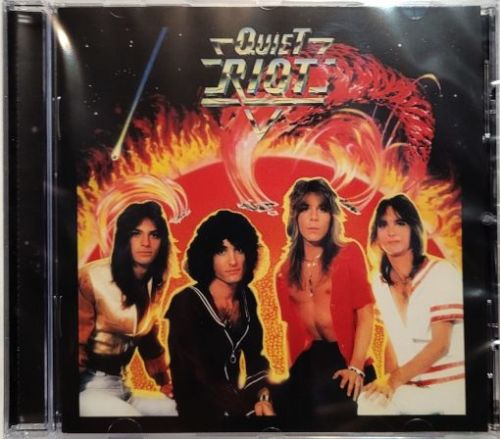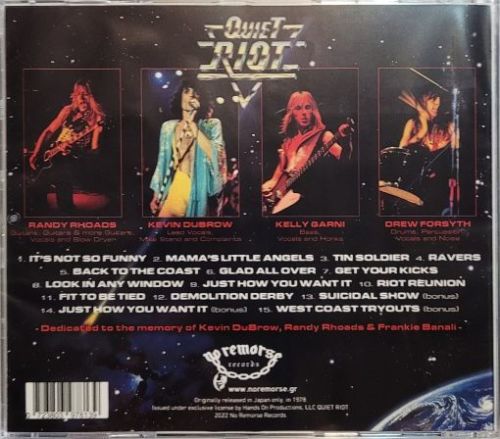
QUIET RIOT’s discography is a very particular case, because the band’s first two albums, their self-titled debut from 1977 and “Quiet Riot II” from 1978, were only released in Japan.
For the western world, the first album was “Metal health” from 1983, already with another formation, which was a commercial success with hits like “Cum on feel the noize”. But before there were also those works, which are important for the history of Quiet Riot and where the impressive talent of Randy Rhoads was first exposed to the world.
”Quiet Riot I & II” never were officially released on CD, and specialized label No Remorse Records had been working closely on the reissues for years, exchanging many emails and conversations with Frankie Banali, who believed that these albums are very important in Quiet Riot’s legacy as they paved the way for the band’s reformation and world-wide success.
Banali’s passing in August 2020 put things on hold for a while, but No Remorse has finalized the final details with Banali’s estate, and long-awaited reissues of early Quiet Riot albums are finally available remastered, properly silver pressed.
Now we have here ”Quiet Riot I” in all its sonic glory, and including 3 collectible, rare bonus tracks.
Quiet Riot is a phenomenon with a long history. The first incarnation of the band dates back to 1975, when the Quiet Riot name was born, with the line-up of guitarist Randy Rhoads, vocalist Kevin DuBrow, bassist Kelly Garni, and drummer Drew Forsyth.
Despite local popularity in Los Angeles, California, they failed to secure a record deal in the United States, but managed to release an EP, now a collectors item. The first two albums, Quiet Riot I and Quiet Riot II, were originally released in Japan, only on vinyl.
Of course, on their debut “Quiet Riot I”, the band is a different beast than later became in 1983.
We hear a ‘young Kevin DuBrow’ here in good ol’ 1977 style. It’s just before his vocals seemed so amplified and energetic on the band’s third release. They are still the high pitched, raspy output vocals that we hear from DuBrow on the albums in the ’80s but less ‘shouty’. At the time DuBrow focused much more on melody and hitting the notes naturally
Where most fans would compare this album to the likes of early Twisted Sister or even the very first Dokken, this record has such a different approach, and I would compare it more to bands like Scorpions, Budgie or Ted Nugent. In other words, the more calm and melodic vocal work mixed with less intensified instrumentation gives it that really early metal sound.

Along with the vocals, the song structures are late Seventies style. Nothing on here gets repetitive at all, nor sounds cheesy. Every song sounds like it took some time to write, and wasn’t written by a group of people working for a record company.
The best tracks are by far the beginning and the end ones, that being “It’s Not So Funny” (released as a single), and “Demolition Derby”. While still having a catchy beat and positive vibe, they cease to have any pop influence and keep the listener interested by every means.
Now, this band has always been notorious for covers, especially by Slade as everyone knows. But here, they covered Small Faces and The Dave Clark Five, with ’70s metal twists, and rather making the covers a hit, it just helped add to the magnificent substance of the album.
Other standout tracks are the riffy “Mommy’s Little Angels” (though lyrics are laughable) and “Get Your Kicks”. But not one track leaves you disappointed.
If Randy Rhoads is on guitar, then it’s a given that it’s going to be good. His riff work flows perfectly and keeps an exceptional pace as he chugs along with DuBrow’s vocals, with no hard edge needed to make it sound well. Although he may not have reached the complexity in his career with Ozzy, it’s still magnificent. For this kind of music, I hardly even think that’s necessary. His solos are less shredding and more melody to overlay the drum and basslines. Although there still is shredding, my favorite guitar piece here is the solo on “Get Your Kicks”, as it’s more calm and melodic rather all over the board shredding.
While production on “Quiet Riot I” isn’t big budget, the bass is very audible and has some ingenious lines that would die out after the sophomore release. You can really feel it if you play it on big speakers, and it’s the greatest way to back up the guitar work.
The drums aren’t nearly as hard and ferocious as one would expect, but as I keep saying, that’s not needed for this kind of music.
Following the release of the second album, Randy Rhoads joined Ozzy Osbourne’s band and Quiet Riot ended. Although the worldwide mega-hit Quiet Riot is technically a different band than these tracks, Kevin DuBrow’s roots in his budding musical awakening, as well as Randy Rhoads, one of the world’s most talented guitarists, can be traced here.
When Frankie Banali and Rudy Sarzo, who played together before this in bands in Florida and Illinois, would go on to form an entirely new band with Kevin DuBrow and Carlos Cavazo, they created a sound that kick-started the pop-metal era.
‘Metal Health’ also includes a new version of the song “Slick Black Cadillac”, originally released on Quiet Riot II, but with the huge success of Metal Health, the early days became a thing of the past.
Still, fans and collectors for years clamored for those albums to be widely reissued at last. That time has come…
01 – It’s Not So Funny
02 – Mama’s Little Angels
03 – Tin Soldier
04 – Ravers
05 – Back To The Coast
06 – Glad All Over
07 – Get Your Kicks
08 – Look In Any Window
09 – Just How You Want It
10 – Riot Reunion
11 – Fit To Be Tied
12 – Demolition Derby
BONUS TRACKS:
13 – Suicidal Show
14 – Just How You Want It
15 – West Coast Tryouts
Kevin DuBrow – lead vocals
Randy Rhoads – lead & rhythm guitars
Kelly Garni – bass guitar
Drew Forsyth – drums